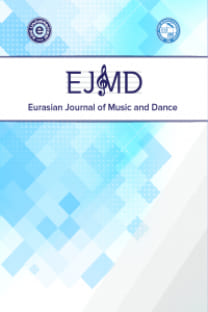TÜRKÜLERDE “NİNNİ” VE SÜMER İZLERİ
"LULLABY" IN TURKISH FOLK SONGS AND THE TRACES OF SUMER
There are many Turkish folk songs having the word “ninni” or the word groupsrelated to ninni such as “nenni - ninni –ninna – tanani – nini - nanninniya – ninniya -ninnana - ninninih- ninanaydam - ninninam – ninom – nina - ninay nom – ninanay –ninalar -nina nininam - narinay ninanay – ninayna - ninay ayda ninay - nina nam ninanina nam - ninina nina - nirinna ninay nay - tanina ninaynam - tanina taninaynam -dina nininam nina nay nam - dinanam dinanam dina nay nam - nina nana nana ninananana na - ninanay nay - nina nini nam –ninanan - ninnayi ninnayi - ninnay daninnari nannari nam - ninnay ninnay - ninna ninna - ninna ninnanam - nininnanirinah nirinna niya –nanay- ninno ninno nino” etc. All these words take place in thepoems of the Turkish folk songs called as Türkü, Semah, or Deyiş. About 170 samplesof folk songs having these words were collected from different regions of Turkey. Inthese folk songs the above words and word groups point to “Înanna” that is wellknowngoddess of Sumer. The other name of Goddess Înanna is “Ninni”. This is alsocommon and shared name in Mesopotamia and in environment cultures with somemodifications of the word such as “Nene, Nina, Nana, Nine” etc. All these wordspoint to “The Lady” that is the Queen and the Goddess of the Heaven and she is agreat helper of the women in marriage, procreation and sex problems. In Sumer thewomen have believed that Înanna have always reached and helped them whereverthey are and whenever they need. That is why in lullabies and in 170 Turkish folksongs related with the subjects “women-marriage-born-baby-child-sleep” have theword “Ninni” and very close words of it. Between Sumer and Anatolia there were avery close relationship in trade, cultural affairs, music, and beliefs etc. One of thegoddess names of Hittites is “Hannahanna” that means “grandmother” just liketoday’s “Anneanne” in Turkish language in Anatolia. This is also very close inphonetic spelling and in meaning to goddess Înanna. Since thousands of yearsSumer culture and the cultures of Anatolia were in a close relationship. Turkishpeople came to Anatolia from Central Asia and maintained their own culturemutually interacting with the Anatolian old cultures. As a result of this mutuallyinteracting, some words just like “Ninni, Nenni, Nen, Nanay, etc.” took part in Turkishfolk songs called as Türkü, Deyiş, and Semah. Finally, all these words in Turkish folksongs “Nen, Ninni, Nenni, Nana, etc.” transferred from the old believing and prayingtimes to Goddess Înanna (Ninni) of both Sumer and Anatolia.
___
- GELB, J. The Name of the Goddess Innin, Journal of Near Eastern Studies, 19. Cilt, No. 2 (Apr., 1960).
- MONAGHAN, Patricia. The Goddess Path - myths, invocations and rituals, U.S.A. 1999.
- OSTLING, Richard N. The Search of Mary, Handmaid or Feminist, The Time, Aralık 1991.
- FARSAKOĞLU, Ayşe. Türk Ninnilerinde İslami Motifler, Yüksek Lisans Tezi, T.C. Atatürk Üniversitesi Sosyal Bilimler Enstitüsü İslam Tarihi Ve Sanatları Anabilim Dalı, Erzurum, 2006.
- ÇELEBİOĞLU, Amil. Türk Ninniler Hazinesi (TNH), İstanbul -1982.
- ALPTEKİN, Ali Berat. “Ninni”, Türk Dili ve Edebiyatı Ansiklopedisi (TDEA), Devirler/İsimler/Eserler/Terimler, S. VII. İstanbul 1985-1986.
- CAVENDISH, Marshall. Gods, Goddesses, and Mythology, Marshall Cavendish Corporation, New York 2005.
- DEL GIUDICE, Luisa (for Elena), “Ninna-nanna-nonsense? Fears, Dreams, and Falling in the Italian Lullaby”, The Italian Lullaby, Oral Tradition, 3/3 (1988): 270-293.
- KRAMER, Samuel Noah. "u5-a a-u5-a: A Sumerian Lullaby (with Appendix by Thorkild Jacobsen)", in Studi in onore di Edoardo Volterra, Università di Roma: Milano 1971.
- http://www.definelerim.com/eski-anadolu-da-olum-inanislari-t276.html
- http://www.dl.ket.org/humanities/connections/class/ancient/mesopmusic.htm
- ISSN: 2651-4818
- Yayın Aralığı: Yılda 2 Sayı
- Başlangıç: 2011
- Yayıncı: Ege Üniversitesi
Sayıdaki Diğer Makaleler
TÜRKİYE’DE “ÇOKKÜLTÜRLÜLÜK” BAĞLAMINDA HALK MÜZİĞİ ARAŞTIRMALARININ GEREKLİLİĞİ
TÜRK MÜZİK KÜLTÜRÜNDE ÇALGI VE ÇALGI MÜZİĞİ
TÜRKÜLERDE “NİNNİ” VE SÜMER İZLERİ
TÜRK MÜZİĞİNDE ULUSLARARASI SANAT MÜZİĞİNDEKİ BİR BESTELEME TEKNİĞİNİN KULLANIMI: ‘UYARLAMA’
